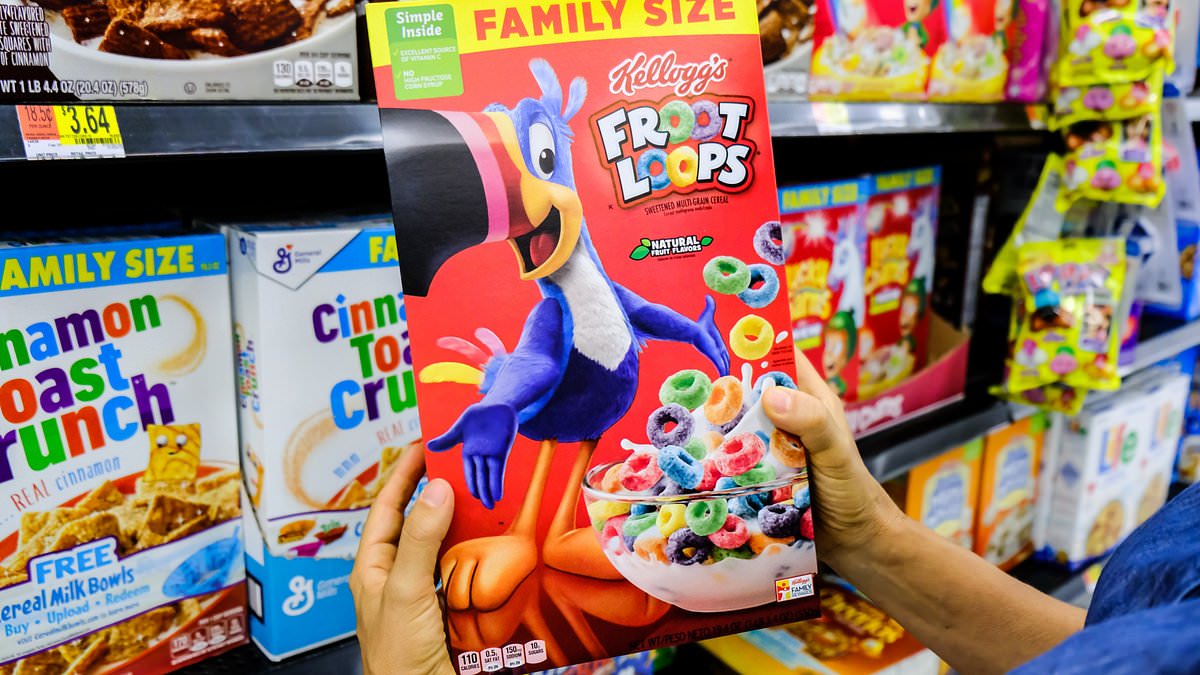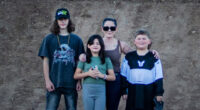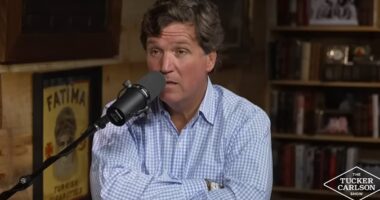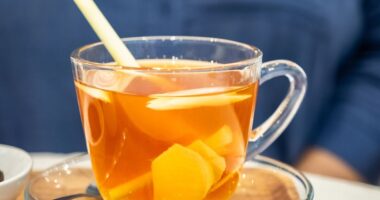A leading food safety expert has branded Kellogg’s Froot Loops the worst breakfast cereal in the US – amid protests about the ingredients in the product.
Ex-FDA food chief Dr Darin Detwiler told DailyMail.com that the colorful rings are ‘heavily processed and contain high levels of added sugars, artificial dyes, and preservatives, which are linked to health concerns.’
The morning snack contains 12.35g of sugar per serving (one cup), or three teaspoons, which is almost half of a child’s daily allowance.
Dr Detwiler notes that most children ‘consume a lot more than the recommended serving size, as one cup is not a realistic amount.’
But more concerning is the additives Froot Loops contain. Dr Detwiler said Red 40, a dye that gives the hoops their neon red color, was the most concerning.
It’s banned in several European countries for its link to hyperactivity and cancer, and are not present in most products internationally such as those in Australia and Canada.
He says the worst offending dye in Froot Loops is Red 40, which has been been banned in several European countries for its link to hyperactivity and cancer, and are not present in most products internationally such as those in Australia or Europe.

A leading food safety expert has branded Kellogg’s’ Froot Loops the worst offending breakfast cereal on the market in the US
Along with campaigners, most notably actress Eva Mendes, Dr Detwiler is calling for Kellogg’s to ‘consider reformulating their products to reduce the use of artificial additives, dyes, and high sugar levels.’
He continues: ‘With growing concerns about the long-term health effects of processed ingredients, especially those linked to cancer risks like certain food dyes, Kellogg’s has the opportunity to lead in healthier food production.
‘By focusing on cleaner ingredients and transparency, they can address consumer concerns and shift toward healthier, more sustainable food options.’
Some of the other cereals Dr Detwiler recommends steering clear of are Lucky Charms for its high sugar content and artificial colors, and Frosted Flakes for their high sugar content.
‘These cereals may also contain food dyes linked to potential health risks, which is a concern when consumed frequently, especially by children,’ he adds.
With all of these cereals, Dr Detwiler says they should ‘only be considered occasional treats and most definitely not consumed on a daily basis.’
New York-based nutritionist, Lisa Moskovitz, agreed with this serving suggestion, telling DailyMail.com: ‘Even though these sugary cereals are harmless in very small quantities, if consumed on a regular basis, they could pose a health problem.’
Dr Detwiler’s comments come off the back of Eva Mendes demanding the removal of ‘harmful’ food dyes in popular American children’s cereals.
The 50-year-old actress took to Instagram last week to warn about artificial dyes in Kellogg’s cereals like Froot Loops.

California has banned six food additives, while states like New York and Illinois have introduced similar legislation
Dyes such as red 40 and yellow 5 have been banned in many parts of the world but they continue to persist in US versions.
Kellogg’s promised to remove artificial colors and ingredients from all of its cereals nearly a decade ago by 2018 but has yet to deliver on that promise.
Mendes, who shares two daughters with husband Ryan Gosling, called on Kellogg’s to remove these dyes and urged her 6.6million followers to join a ‘peaceful march to Kellogg’s HQ.’
That protest took place Tuesday outside of the cereal giant’s Michigan headquarters, where dozens of activists delivered a petition with nearly 400,000 signatures.
Mendes wrote on Instagram: ‘I grew up on cereal. I still love it but I won’t eat @kelloggsus anymore after I found out that so many of the ingredients they use here in the US are BANNED in other countries.
‘Why? Because they’re harmful for children.’
Mendes compared the nutrition labels of Froot Loops in the US and Canada.
The American variety contains red 40, yellow 5, blue 1, yellow 6, and butylated hydroxytoluene (BHT), which have been linked to health problems in children.
Canadian Froot Loops replaced these dyes with concentrated blueberry, carrot, and watermelon juices.
In a statement, Kellogg’s said: ‘Our products – and the ingredients we use to make them – are compliant with all applicable relevant laws and regulations.’
‘We remain committed to transparently labeling our ingredients so consumers can easily make choices about the food they purchase.’
The company also claims that 85 percent of its cereals do not contain colors from artificial sources.

Mendes shared the above comparison of Froot Loops in the US versus Canada

Actress Eva Mendes took to Instagram last week to call for Kellogg’s to remove ‘harmful’ food dyes and additives from its cereals
Red 40, yellows 5 and 6, and blue 1 are dyes used to give cereals and other processed foods their bright colors.
They have been theorized to exacerbate attentional problems in children, leading EU regulators to mandate that product makers say dyes could cause ‘an adverse effect on activity and attention in children.’
A 2021 report from California’s Environmental Protection Agency also linked artificial dyes to “hyperactivity and other neurobehavioral problems” in some children, particularly those with ADHD or other existing behavioral disorders.
Red 40 as well as Yellow 5, and Yellow 6 also contain benzidene, a human and animal carcinogen permitted in low levels.
According to the FDA, ingestion of free benzidine raises the cancer risk to just under the ‘concern’ threshold, or one cancer in 1 million people.
BHT, meanwhile, is an additive used to keep food fresh. It also may be found in beauty products like lip glosses and lotions, as well as chewing gum.
The research on BHT is mixed, though some studies have suggested that it long-term exposure cause liver and thyroid issues in mice by disrupting hormones.
Several states have made steps to ban or restrict these additives. Earlier this year, California became the first state to ban schools from serving foods containing red 40, yellow 5, yellow 6, blue 1, blue 6, and green 3.
In March, New York state officials called for the removal of red dye No. 3, propylparaben, brominated vegetable oil (BVO), potassium bromate, titanium dioxide, azodicarbonamide, and BHA.










